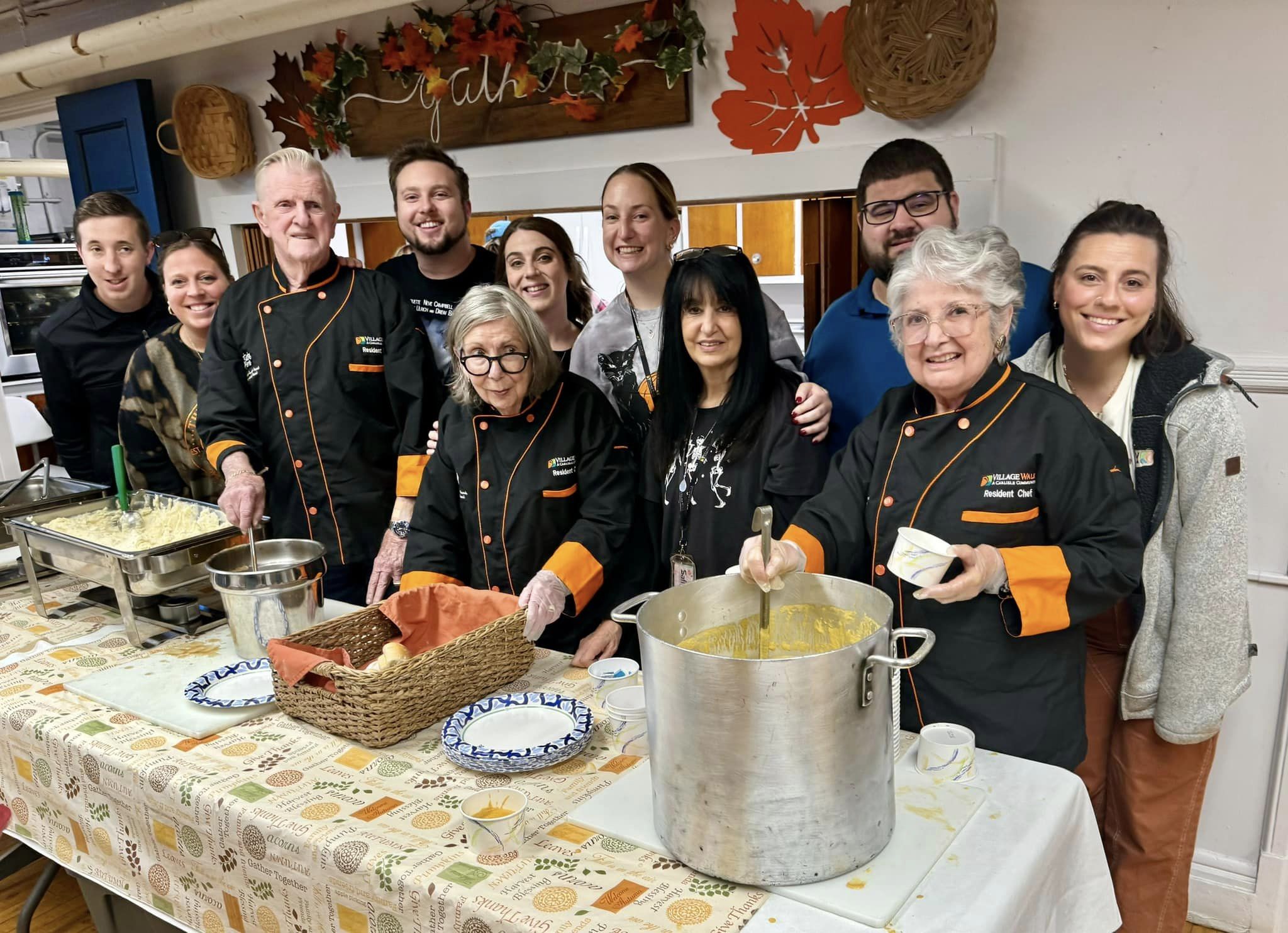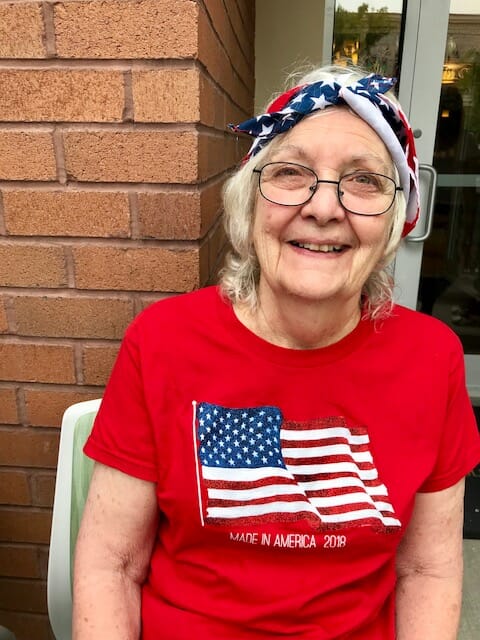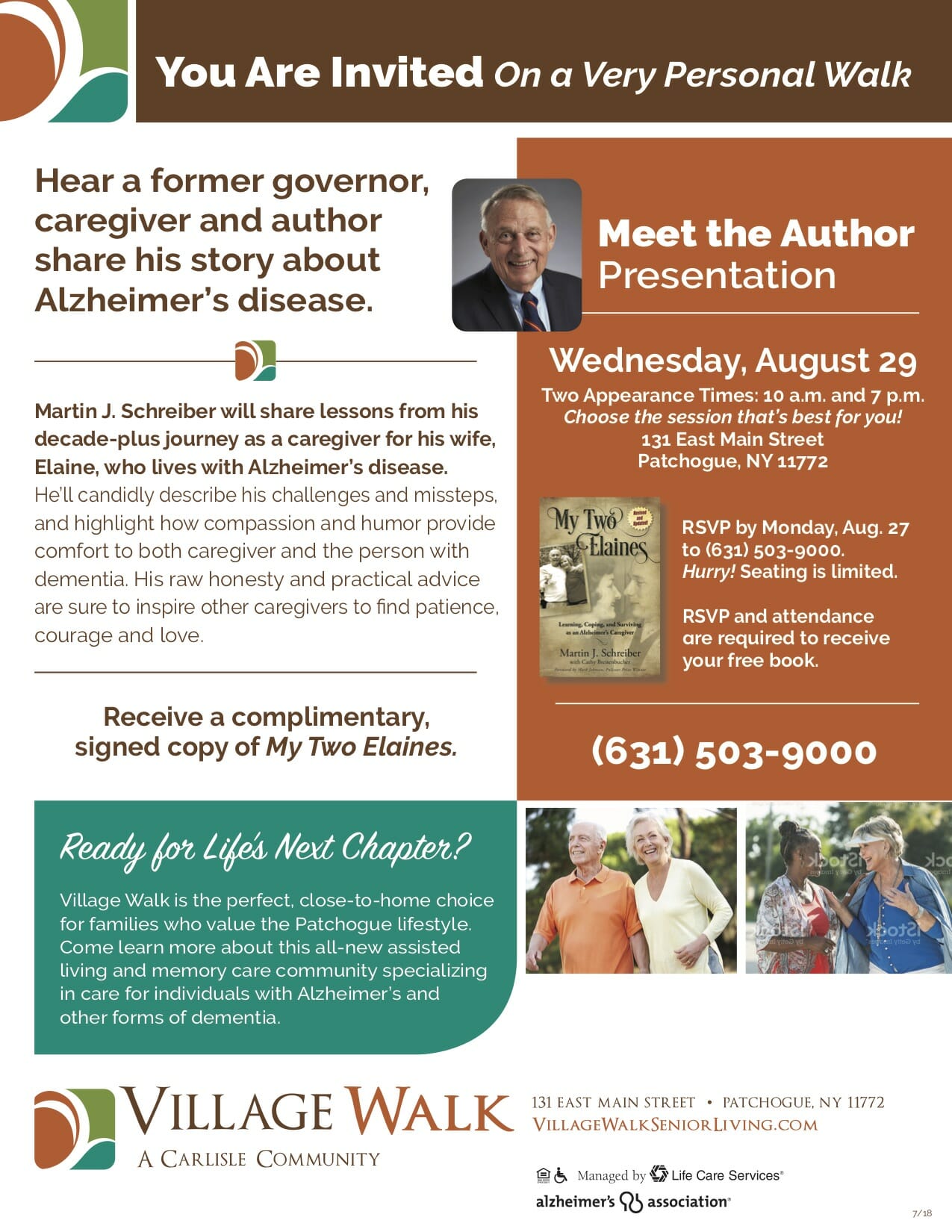At a certain point in our lives, we all need a little extra help with daily living tasks. No one understands that better than our senior care staff at Village Walk. Seniors and families: if you’re thinking about assisted living — or who provides assisted living — you’ve come to the right place.
Our expert team of senior living advisors, recreational staff, and caregivers have heard your questions, and we have answers.
In this article, we’ll discuss:
- What services are provided with assisted living — as well as who provides them
- How to choose an assisted living facility that meets your needs
- The cost of assisted living for older adults
- Helpful resources to continue your learning on assisted living
- Frequently asked questions about assisted living care services and personnel
Grab your favorite beverage and note-taking device. This is Assisted Living 101.
Services provided with assisted living
Caregivers, recreational therapists, nursing staff, culinary chefs, and nurse aids provide the bulk of the following assisted living services:
- Healthcare management for memory loss and other health conditions
- Help with activities of daily living such as bathing, grooming, dressing, and eating
- Light housekeeping and laundry
- Medication management
- Life enrichment programs and activities
- Security on the premises
- Transportation to and from doctor’s appointments, errands, and activities
Senior living staff in an assisted living facility provide the above-mentioned care services. The staff at an assisted living facility can also contract out services, should a resident need specialized care or support with activities of daily living.
Choosing an assisted living facility
As part of a better understanding of who provides assisted living and what assisted living can provide, older adults and their families should note that the potential for needing assisted living exists in all of our lives.
The following suggestions can help make searching for a safe, secure, comfortable, and caring assisted living facility more tenable.
- Project into the future: What are your and your loved one’s long-term needs? Will the facility in question be able to meet those needs?
- Location, location, location: Is the residential facility close to family and friends? How about shopping, points of interest, and medical facilities?
- Admission policies: What are the facility’s admission and retention policies? Will the policies include care for people with severe dementia, memory loss, and/or physical disabilities?
- Values and mission statement: Does the assisted living facility talk about what they stand for and value?
- Schedule a tour — or show up unannounced: visit each facility, visit at meal times, and visit to observe how the residents and staff interact with each other.
- Life enrichment activities: check to see how inclusive the community is. Does it offer activities for the mind, body, heart, and soul?
- Get in touch: Reach out to the residents to feel out the vibe at the facility.
- Training and certifications: ask the staff what type of training they received and what ongoing continuation and professional development looks like at the facility.
- Review state licensing reports: comb over state licensing reports to understand the facility’s accreditations.
Getting a feel for an assisted living unit’s reputation
What’s more, when trying to understand the level of care that assisted living offers — and the reputation of the facility — consider the following three tips:
- Check with your state’s long-term care ombudsman to determine whether complaints were filed against the assisted living facility of interest. In many places across the U.S., the ombudsman will check on the conditions of the nursing home, assisted living facility, board and care home, or other senior living facility.
- You can also check with the Better Business Bureau (BBB). Questions to ask them include, “What is the reputation of this skilled nursing care and/or assisted living facility?” and “Has this facility received any complaints from residents and the community?”
- If the assisted living facility has a memory care, board and care, or nursing home care unit, inquire about its reputation. Doing so will give you a better idea of the overall feel of the assisted living facility.
Assisted living costs
Assisted living costs less than nursing homes. The costs depend on the type of services, caregiving, and living arrangements present.
Assisted living facilities tend to charge a base cost and extra costs for extra services. Residents and their families should note how much each extra service costs because fees can add up.
In general, in the U.S., assisted living residents and their families can expect to pay anywhere from $40,000 to as much as $100,000 or more per year for assisted living. Depending on the state, certain long-term care insurance policies and plans can cover some of the costs.
Alas, the federal Medicare program doesn’t cover the costs of care that assisted living communities offer. But, in some states, Medicaid can pay for some assisted living services.
More resources about assisted living
For older adults and their families looking to learn more about their options for assisted living, they can contact their local area agency on aging (AAA). Aside from AAAs, We’ve also compiled a few websites and personal resources about assisted living communities that might help:
Did you know?
If you or a loved one is a veteran or a spouse of a veteran, financial assistance is available and may cover the cost of assisted care. Our senior living facility has held webinars on this hot topic in the past.
Learn more here on our Facebook page.
Village Walk’s assisted living care specialists can help
Every facility is different. With every assisted living facility, expect a wide range of services and opportunities, everything from occupational therapy to speech therapy to fitness and music.
The short answer to the question, “Who provides assisted living?” is: many people. After all, it takes a village to build something beautiful.
To learn more about what our Village offers — or to inquire about personal care and residential care at an assisted living facility near you — don’t hesitate to reach out.
We’d love to get to know you and see how we can help!
Frequently asked questions about what assisted living provides
1. Who provides care in assisted living facilities?
Assisted living care communities are comprised of a team of care specialists who provide many diverse services. For example, the specialists who provide care in our facility include:
- Physical therapists
- Speech therapists
- Occupational therapists
- Music therapists
- Recreational therapists
- Skilled nurses
- Nursing aides
- Culinary chefs
- Our senior concierge staff
- Our custodial team
- Our security and grounds team
- And more
Many retirement communities and senior life space communities provide similar services. Nevertheless, the goal of assisted living community staff members is to assist residents with their care needs.
2. How do assisted living staff provide personalized care?
Before move-in day comes, assisted living residents must be assessed. According to state regulations, the level of personal care a resident receives is determined by a health assessment.
Throughout the year, a resident is reassessed to make sure that the care they receive is in line with their needs.
A more involved assessment procedure exists for those in memory care units and/or for those living with memory loss.
3. What are activities of daily living?
Activities of daily living (ADLs) is a term used to describe the basic skills that all individuals need to live in life. Some of these ADLs include:
- Movement: including standing, sitting, walking, lying down, rising up, and climbing up and down stairs
- Grooming: think personal hygiene-related tasks like brushing teeth, bathing, shaving, and hair care
- Continence: including the ability to control the bladder and bowels, using the toilet, and cleaning up after using the restroom
- Dressing: including wearing and taking off clothing
- Eating: including meal preparation, handling utensils for eating, and cleaning up after meals
Individuals looking for assisted living care tend to need help with at least two or more ADLs.
“Feels like they’re at home, not in a home”
“My mother had been living in an assisted living facility upstate, but as she got older, I felt it was time to move her closer to where I lived. Armed with a list of about 30 pivotal questions, I interviewed 10 different facilities on Long Island.
As I continued to interview other facilities, Village Walk became the place I was comparing them to, and I found that nothing really did compare. I moved my mother in three days before her 91st birthday and she just loved it.
She eagerly got involved in arts and crafts, went on all of the outings to museums, restaurants, shows, parties on the roof, prom, etc. I loved talking to her every evening to find out what wonderful things she did that day.
I often told my friends that my mother was living her best life — and she was! She became very close with the staff and thought of them as family.
I think that’s one of the things that sets Village Walk apart, the care of the staff, which is the heart of any assisted-living facility. I highly recommend Village Walk If you were looking for a place where you want your loved one to feel like they’re at home, not in a home.
A place where they will feel like they are part of a bigger family. A place where they can feel safe, explore new things, meet new people, have fun and, most importantly, feel like they still have purpose.” – Wendy Way, grateful Village Walk family member.








